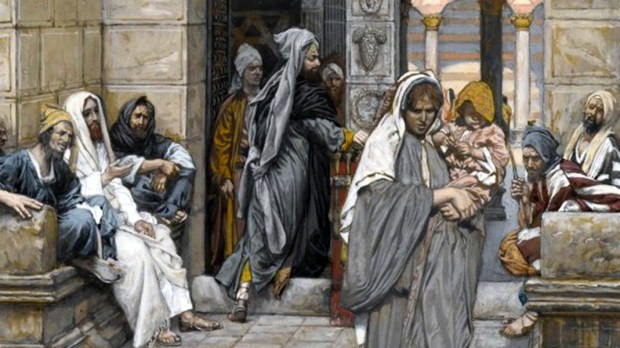If you have ever looked from your mirror to your bedroom and back to your mirror and asked, “Is this it?” Sunday’s readings are for you.
Jesus shows exactly where — and how — life can be fulfilling in the Gospel on Sunday, the 32nd Sunday in Ordinary Time, Year C.
It starts when Jesus answers an unrealistic question about marriage with a hyper-realistic answer about heaven.
In Jewish law, if a woman’s husband died, it was his brothers’ duty to marry her to produce offspring for the deceased. A Sadducee invents a scenario in which a string of deaths make one woman the widow of a string of dead brothers.
“Now, at the resurrection, whose wife will that woman be?” he asks.
Jesus taught what we say in the creed when we “Look forward to the resurrection of the dead.” The Church takes that literally. “We believe in the true resurrection of this flesh that we now possess,” says the Catechism.
The Sadducee is trying to make the very idea of the resurrection of the dead seem absurd. Jesus answers by pointing out that an earth-bound existence is absurd.
Jesus’ vision of death puts life in perspective.
After the resurrection, Jesus says, people will “neither marry nor are given in marriage. They can no longer die, for they are like angels; and they are the children of God.”
We think of marriage as the central identity of a person’s life, and we should. But marriage, like the other sacraments, is not an end point, but an avenue to Jesus Christ.
We don’t find happiness ultimately in the sacraments themselves, but in the one who is present in them: Jesus. If we go to heaven when we die we will no longer need communion, confession, or marriage to bring us to God, because we will be with God.
That means that our existence after the resurrection will include a “new heaven and a new earth” and even eating — as the behavior of Jesus after his resurrection attests — but it won’t include marriage.
Which makes sense, if you think about it. Our bodies will remain our bodies, but as much as she may love me, April Hoopes will not want to spend all of eternity devoted to a creature made in the image and likeness of God; she will want to spend it devoted to the real thing. In life, my imperfect love may point to him, but in death she will want the Love who knows her innermost thoughts and answers her deepest longings.
If you don’t want to wait for heaven, the readings also offer a way to find fulfillment on earth.
The first reading is ironic, given today’s Gospel. The Sadducees made up seven brothers who die. The first reading tells about the seven Maccabee brothers who actually did die.
But these are not brothers who claim their rights by law like those in the Sadducee’s story; these brothers are willing to give up their rights in order to keep to the law.
“The King of the world will raise us up to live again forever,” says one. “It is for his laws that we are dying.”
They dramatically show the way to find fulfillment on earth: Don’t wait for death. Give your life to God now.
“Happy are those who hunger and thirst for righteousness,” Jesus said — and it’s true. When we are actively seeking the right with integrity and energy, we are truly happy.
For those who aren’t facing martyrdom, St. Paul proposes another way.
St. Paul gives one last pathway to fulfillment in the second reading. He is writing his Second Letter to the Thessalonians, to address a concern they have about death and resurrection before the return of Christ.
Paul gives them counsel not just on that, but on life on earth as we wait.
God gives us “everlasting encouragement.” Only he can “encourage your hearts and strengthen them in every good deed and word.”
Our happiness comes from knowing that “the word of the Lord may speed forward and be glorified” through evangelization.
In short, our God is the God of the living, not the dead.
What Jesus told the Sadducees as a proof for the resurrection from the dead can be applied to our everyday life: “He is not God of the dead, but of the living, for to him all are alive.”
That changes the landscape of heaven, but it also changes what we see in our mirror and our room: We are his, and will be forever if we give our life to him each day.

Read more:
What will happen to the planet at the end of the world?

